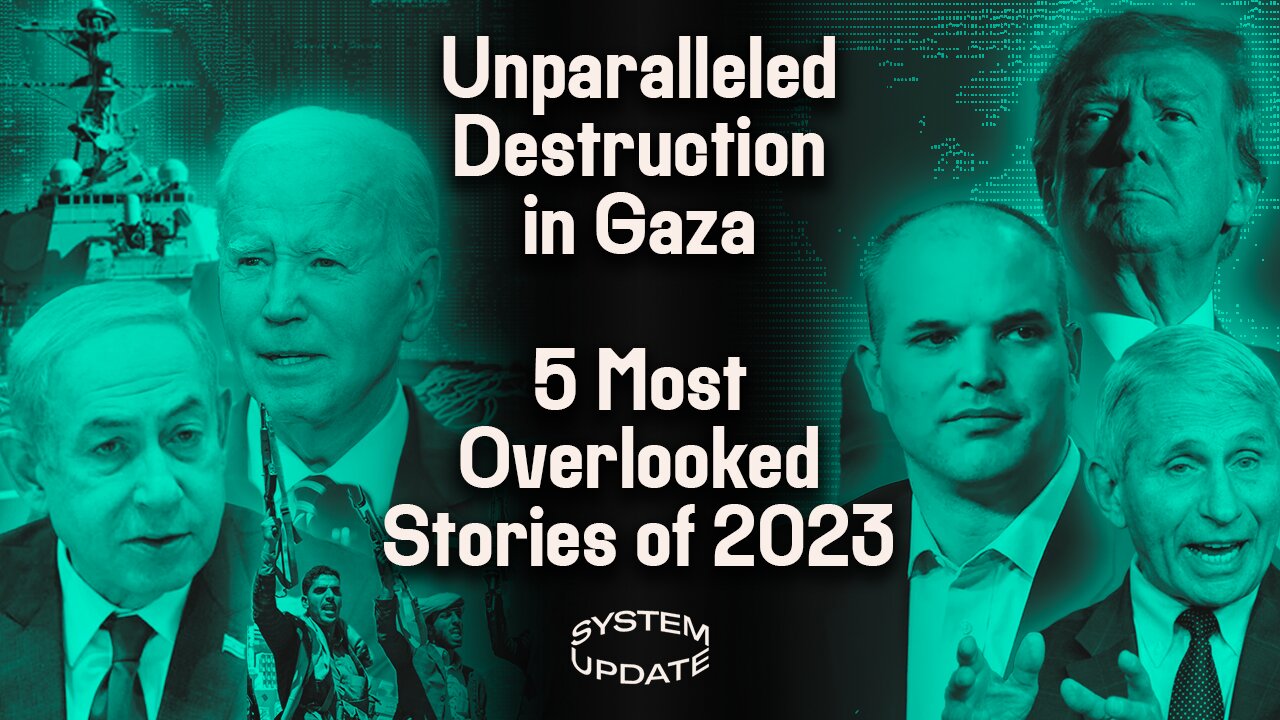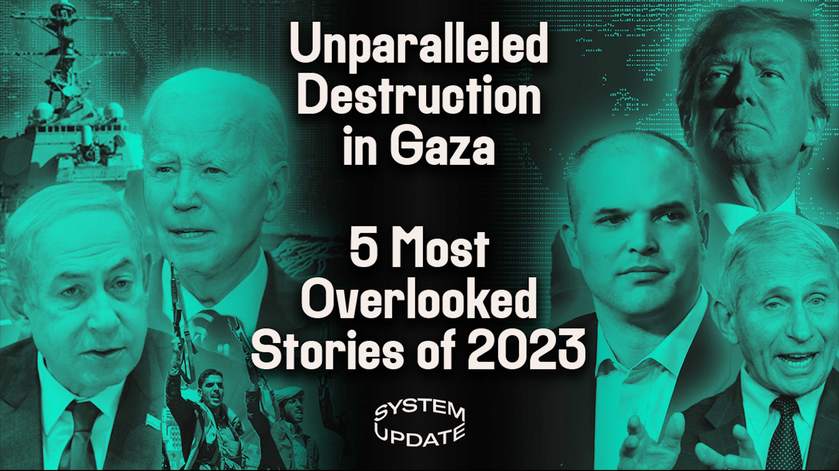Watch the full episode here:

Good evening. It's Friday, December 22.
Tonight: this will be our last show of 2023. We decided we would take next week off so that our team could have a full Christmas holiday with their families. It has also been a very challenging year for my own family, and this holiday season won't be easy for us. So, spending this last week together with my family and kids is an important way to come back fully revitalized and with full batteries for 2024, which will undoubtedly be a year full of intense, unpredictable, and unprecedented political stories. As we head into one of the most unique presidential elections in our nation's history, where the leading candidate for president is being charged with all sorts of crimes as the opposition party tries to imprison him and keep him off the ballot.
To close the year, I want to take some time to reflect on where we are with the topic that has dominated our show coverage and much of the world's attention over the last two and a half months, namely the war in Gaza that is being waged by Israel as a response to the Hamas attack on October 7 that killed hundreds of Israeli civilians.
As is true for the war in Ukraine with Russia, this is not just a foreign war that Americans and Westerners generally can dismiss as having nothing to do with us. The opposite is true in every conceivable way, with the exception of the deployment of combat troops to the war zone, both wars are American wars and European wars. The Biden administration is funding and arming the Israelis in this war. The bombs that drop on Gaza and destroy its infrastructure and kill thousands of its civilians, including children, are bombs that come directly from the United States, from the Pentagon, on orders of President Biden. Regardless of your views on this war and on the Biden White House's decision to finance and arm it, the United States is incurring massive costs for its decision to support Israel and everything it is doing in Gaza.
Public opinion, in the West and the world generally, has clearly been moving in the direction of demanding a cease-fire. There is now a mountain of credible empirical evidence from multiple sources that the level of destruction taking place in Gaza and the rate of civilian casualties has no rival in any war fought in this century. Indeed, one has to go back to some of the worst civilian abuses of World War II to find comparable data in terms of the destruction of civilian infrastructure and the rate of civilian death. In some cases, not even the unconstrained and deliberate killing of civilians by both the Allies and the Axis powers during World War II can compare to some of what is being done in Gaza. Those are just empirical facts. And remember that the world decided after World War I, but especially after World War II, after surveying what was done, that the savage and barbaric levels of civilian death were something it never wanted to see repeated. Thus, altogether, the world implemented the infrastructure of the laws of war, some of which already existed and were fortified, some of which were brand new, that were designed to govern the conduct of how all nations must fight all wars in the future: innovations such as the Geneva Conventions and the International Criminal Court, and prohibitions on collective punishment that make collective punishment a war crime.
There has been no issue that I had to report on and analyze in many, many years that has polarized my audience like the Israel-Gaza war. As we have discussed before, we had a non-trivial number of people cancel their subscriptions over it, the lifeblood of our show, as well as simply tune out. But our audience remains quite strong, far more than what we had predicted it would be after one year of first launching our program on a platform, Rumble, that still 60% of Americans have never heard of, which means there's a massive opportunity for growth. But there was simply no way for me not to talk about this war in the most honest way I could, and not to do so once or twice to say that I did it, but to do so in-depth and not just cover the war itself, but all the profound effects it has had on American political life: from new calls for censorship to massively intensified limits on campus speech and cancel culture campaigns far more potent and well-funded than any we have seen up until this point. Ones that have included dozens of firings from people in media, politics and academia for expressing their political views on this war. We had a truly extremist billionaire-led campaign to have students, 20-year-olds and 21-year-olds, put on “No hire” lists and for trucks to drive around their campus with their names and faces on them, accusing them of antisemitism due to their criticism of Israel, a foreign country.
I am proud that we have had many viewers who are supporters of Israel and the war, both nuanced and qualified supporters of it and vehement ones who have continued to watch that show. I have many people in my life who are both nuanced and vehement supporters of Israel in this war. Ultimately, the easiest way to destroy the integrity of a news program or your work as a journalist is to start to become calculating and strategic about what you report and how you analyze events to avoid making your audience angry or losing viewers. That's called audience captor, and few things are more corrosive. The war in Gaza is very far from over, unfortunately, which means that the cost and effects of this war in the United States and on American citizens are very far from over as well. The extinguishing of innocent lives continues to mount in Gaza. Life for Palestinians in Gaza and the West Bank is changed forever and the U.S. played a direct role in all of that. So, we wanted to use our last show of the year to look around and see where we are with this war, where it is likely to go and what the consequences of it are likely to be.
Then: one of the main objectives I've always had with my journalism platform and the reporting I do is to try to cover stories and viewpoints that I believe are receiving insufficient attention elsewhere. In general, if something is being covered by everybody else in a way that everybody else is speaking about it, I tend to avoid that. I just don't see that as a very constructive use of my platform. In my view, is one of the primary benefits of independent media to be free to cover events that are being largely ignored and to do so in a way that deviates, sometimes radically, from the standard orthodoxy of mainstream institutions.
On System Update in 2023, we covered a wide range of events and debates. Many of the stories we worked on had repercussions in the discourse and our policies. But as is usually the case, I end the year believing that some stories received far too little attention in discussion given their significance. So rather than pick the five stories we thought were the most important of 2023 or something, we decided instead to use what will be our year-end show in a last-ditch effort to highlight those five shows where we reported on the issues that we still believe merit a lot more attention than they've received thus far.
And then finally, shortly before we went live on the air, maybe an hour or just a little bit more, Rumble, the platform that hosted our program, the one that we came here in order to have our show because of its commitment to free speech, announced that it was blocking the entire nation of Brazil from being able to use that platform or to view that platform.
This has no effect on our show other than preventing Brazilian viewers who don't know how to use VPNs from being able to continue to watch. It has no technical effect on our ability to broadcast or upload. But the reason Rumble felt compelled to leave Brazil, the sixth most populous country on the planet, with a population of 270 million people, is that Rumble is saying you cannot access our platform or use our platform. The rationale for that is similar to the rationale that caused Rumble to be forced out of France late last year because the censorship regimes of these countries in the democratic world are becoming so suffocating and so repressive that platforms are now faced with the almost impossible choice of either complying with an endless stream of unjust censorship orders designed to silence dissidents or refuse to make their services available to all of those countries as they try to contest the validity of this censorship regime with judicial challenges. We'll tell you what happened here with Brazil and Rumble and what it says about the rapid erosion of online free speech in the democratic world.
For now, welcome to a new episode of System Update, starting right now.






















